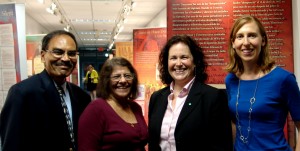Green Dot author/founder Dorothy J. Edwards headlined the 2014 Ahimsa/Nonviolence Seminar entitled, “Silent Majorities: Bystander Intervention to Prevent Violence” that took place on September 29 in the Konover Auditorium of the Thomas J. Dodd Research Center at the University of Connecticut, Storrs Campus.

The standing room only event was generously supported by an endowment funded by key members of the Greater Hartford Jain Center; it was organized with the Office of the President/Susan Herbst, who also gave the Welcome Address, and the Office of Diversity and Equity/Elizabeth Conklin, who also serves as the Title IX Compliance Officer. U.S. Senator Richard Blumenthal of CT offered supportive remarks and surprised all who had attended with his unannounced appearance. The Institute also received additional support from the university’s Asian American Cultural Center, the Women’s Center, the Puerto Rican /Latin American Cultural Center, the African American Cultural Center, and the Rainbow Center.
Dorothy J. Edwards, author of the “Green Dot etc. Violence Prevention Strategy,” holds a Ph.D. in Counseling Psychology from Texas Woman’s University. Prior to her current position, serving as the Executive Director of Green Dot, etc., a center dedicated to effective intervention and prevention of power-based personal violence, Dr. Edwards served for five years as the founding Director of the University of Kentucky Violence Intervention and Prevention Center. She has worked in both counseling and teaching capacities in higher education at Appalachian State University and Texas Women’s University as well as founding the Community Education Program at Denton County Friends of the Family, addressing sexual assault and relationship violence. With a specialty in primary prevention, she provides training and consultation in the areas of power-based personal violence, organizational capacity building, program implementation, strategic planning and community mobilization. Dr. Edwards is currently working with government entities, state coalitions, military, non-profits, community organizations, high schools and colleges from around the globe.
In her opening remarks, Asian/Asian American Studies Institute director Cathy Schlund-Vials reminded the audience of the Institute’s motivation for holding the annual Ahimsa/Nonviolence lecture that “consistently pushes us to rethink, re-envision, and re-imagine a space where nonviolence – not conflict – is the norm; where one is judged not by self-gain but by kindness, generosity, and compassion; and where theories of nonviolence intersect with practices of non-harm.” She also elaborated on this year’s theme, adding,
the title of this year’s lecture – “silent majorities” – may strike some as odd insofar as the term, “silent majority,” was a rallying cry for the Nixon administration. Indeed, Nixon accessed such nomenclature as a means of dismantling the progressive aims of the Civil Rights movement and the anti-war movement. Even so, when one considers the etymology of the phrase, one is struck by the degree to which it was originally linked – in the nineteenth century – to those who were victims, the individuals who perished as a consequence of war, state-authorized violence, and nationally-sanctioned conflict. It is therefore unavoidably connected to a human rights directive, though this association has troublingly been lost. We thus reclaim the term and recalibrate it to fit, as Mahatma Gandhi directed, our desire to be the change we want to see in the world.